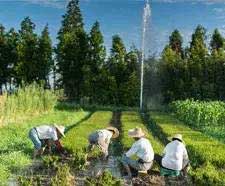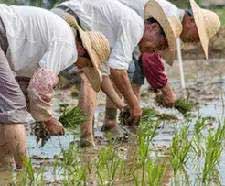Ancient village unveils history of rice farming in China
(chinadaily.com.cn)
Updated: 2015-07-23
An agricultural field study program concluded at a village in Bacheng town, Kunshan, on July 22.
The program was carried out from July 15 to 22 in Chuodun village – a place with a 6,500-year-old history in rice farming, according to archaeological discoveries.
 |
|
Farmers transplant rice seedlings in a field.? [Photo by Kunshan Yangchenghu Tourist Center] |
During the eight days study period, students in the program were introduced to the biodiversity around the village and learned how to observe soil, water and weather before arranging farming activities.
They also learned the value of the wild varieties of rice and those that have been cultivated over time. A number of varieties found locally have adapted naturally or been shabed by cultivation conditions, without the intervention of genetic engineering.
 |
|
Farmers transplant rice seedlings in a field. [Photo by Kunshan Yangchenghu Tourist Center] |
Song Yiqing, a senior researcher on breeding from the Chinese Academy of Sciences, and Zhang Lanying, an associate dean of rural development college at Southwest University, were invited to give lessons to students during the program.
The program was organized by the Qingcheng Project team. The project was undertaken by staff from a research facility set up by Renmin University of China in Dec 2013 at the village to study sustainable agriculture.
The research center also serves the purpose of raising ecological awareness and preserving traditional farming culture.
News
Four special holiday dishes to try in Kunshan
Like Christmas Day in the West, it is traditional in China to cook up an enormous feast on Chinese New Year, with dinner tables groaning under the weight of dozens of dishes.


